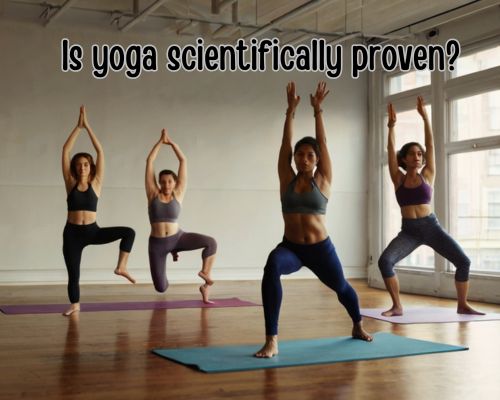Yoga has long been praised for its physical, mental, and emotional benefits, but many still wonder: Is yoga scientifically proven? In Mornington, Australia, where a growing wellness community embraces holistic health, this question is more relevant than ever. With Bikram Yoga Mornington, this article dives into the scientific backing of yoga, its benefits, and why Mornington locals are increasingly turning to this ancient practice.

The Science Behind Yoga
Yoga is more than just stretching and meditation; it’s a discipline that integrates movement, breathwork, and mindfulness. Over the past few decades, numerous scientific studies have validated the effectiveness of yoga in improving overall well-being. Research published in the Journal of Clinical Psychology and the National Institutes of Health supports the claim that yoga positively impacts mental health, reduces stress, and enhances cognitive function.
A 2017 meta-analysis in the Journal of Alternative and Complementary Medicine concluded that yoga significantly reduces cortisol levels, a stress hormone linked to anxiety and depression. Another study by Harvard Medical School found that yoga enhances brain plasticity, promoting better concentration and emotional regulation.
Physical Benefits of Yoga: Fact or Fiction?
One of the most widely recognized aspects of yoga is its physical benefits. A 2016 study in the American Journal of Preventive Medicine confirmed that yoga improves flexibility, muscle strength, and balance. Practitioners in Mornington who frequent local yoga studios such as Bikram Yoga Mornington and Soul Movement Yoga report enhanced physical endurance and reduced chronic pain.
Scientific evidence also supports yoga’s role in cardiovascular health. A study in the European Journal of Preventive Cardiology highlighted that regular yoga practice can lower blood pressure, reduce cholesterol, and decrease the risk of heart disease. In Mornington, where outdoor yoga sessions are popular along Mills Beach and Mornington Park, residents have found yoga to be a powerful addition to their fitness routines.
Mental Health Benefits of Yoga
Mornington residents who suffer from anxiety or depression may find yoga to be a beneficial, science-backed alternative to conventional treatments. A 2018 study in The Lancet Psychiatry revealed that mindfulness-based practices, including yoga, are effective in reducing symptoms of depression and anxiety. Researchers attribute these effects to yoga’s ability to regulate the autonomic nervous system, balancing the body’s fight-or-flight response.
Local wellness practitioners at Mindful Living Yoga in Mornington emphasize the therapeutic potential of yoga for mental health. Many locals integrate yoga into their routines, often combining it with meditation and breathwork to manage stress levels effectively.
Yoga and Chronic Pain Management
For individuals dealing with chronic pain, yoga has been recognized as an effective, non-invasive treatment. The Journal of Pain Research published a study demonstrating that yoga alleviates lower back pain, arthritis, and fibromyalgia symptoms. The gentle movements and controlled breathing techniques enhance pain tolerance and improve mobility.
Mornington’s aging population and active community members have increasingly turned to yoga as an alternative to medication for pain relief. Local classes tailored for seniors at Mornington Peninsula Yoga cater to those seeking gentle, therapeutic movements that support long-term health.
Can Yoga Improve Sleep Quality?
Yes! A 2019 study in the Journal of Clinical Sleep Medicine found that individuals who practiced yoga experienced improved sleep duration and quality. The calming effect of yoga on the nervous system promotes relaxation, reducing insomnia and restlessness.
In Mornington, wellness retreats such as Harmony Yoga Retreats offer specialized yoga programs focusing on sleep enhancement. These programs incorporate deep relaxation techniques such as yoga nidra, a guided meditation practice that has been scientifically linked to better sleep patterns.
Yoga for Athletes: A Growing Trend in Mornington
Local athletes, including surfers at Fisherman’s Beach and runners along the Mornington Peninsula, have begun integrating yoga into their training regimens. A study in the International Journal of Sports Science & Coaching indicated that yoga improves proprioception (body awareness), enhances flexibility, and reduces injury risk.
Sports professionals in Mornington, such as those at Mornington Sports & Yoga Center, incorporate yoga to support endurance training, injury prevention, and muscle recovery. This scientific approach to cross-training is gaining traction among both amateur and professional athletes in the area.
The Future of Yoga in Mornington, Australia
As scientific research continues to validate yoga’s effectiveness, Mornington’s wellness community is embracing the practice at an unprecedented rate. Whether it’s for mental clarity, physical health, or chronic pain management, yoga has a proven track record of delivering measurable benefits.
For those still wondering, Is yoga scientifically proven?—the answer is a resounding yes. With growing research and local adoption, Mornington residents are increasingly realizing the power of yoga to transform lives.
If you’re in Mornington and want to experience the science-backed benefits of yoga firsthand, consider visiting one of the many studios or joining an outdoor session by the beach. The journey to better health might just begin with your next deep breath on the yoga mat.

